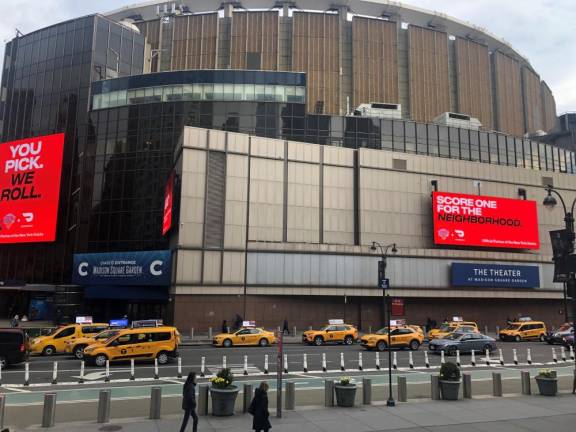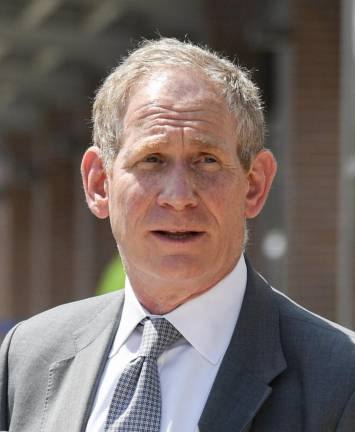MSG Should be Allowed to Stay Atop Penn Station, Says Boro Pres in Backing New Plan
Not all critics are on board with a plan first unveiled by Italian developer ASTM to leave the Garden on top of Penn Station, while knocking down the Hulu Theater to create a new grand entrance and allow more light into the rail hub below ground. CB5, for one, still wants to move MSG.



Proponents for a better Penn Station should abandon efforts to relocate Madison Square Garden and instead focus on winning “significant concessions and cooperation” from the Garden’s owner to rebuild Penn Station with the Garden still on top of it, Manhattan’s Borough President, Mark Levine, declared Monday.
The statement was a watershed moment in the long struggle over the future of both the Garden and Penn Station, which many local residents and advocacy groups say can only be restored to its proper place as a world class transit hub by moving The Garden.
“The problem with continuing to wait for MSG to move is this,” Levine said. “There is no viable alternative site, and certainly no alternative with both a willing property owner and with mass transit access comparable to that of the arena’s current location.”
Levine effectively rejected the recommendation of Community Board Five, which he appoints. The Board had voted unanimously to urge that MSG be forced to move within three years to make way for a new station.
Instead, Levine said a “grand train hub” was possible, without moving the Garden, by demolishing the Madison Square Garden Theatre on Eight Avenue to create a dramatic entryway to a rebuilt Penn Station.
“The presence of the Theater today means there is currently a blank wall on Eighth Avenue, making for an extremely uninviting streetscape,” Levine explained. “Demolition of the Theatre would open the façade for more active uses, allow a widening of the sidewalk, and eliminate the disruption of trucks unloading before shows on the corner of West 31st. street.”
This plan was first floated by ASTM, an Italian developer, but Levine did not specifically mention the company, whose American CEO is Pat Foye, former head of both the Port Authority and the MTA.
“It’s not my job to pick a vendor or side with one company,” said Levine, who said ASTM would have to compete in a formal submission process. “I commend them for elevating this plan. For really sparking a lot of conversation.”
The current head of the MTA, Janno Lieber, has opposed the plan as a wasteful use of scarce capital that is desperately needed for maintenance and upkeep of the transit system. Levine said he was awaiting ASTM’s presentation on the financing of the project.
ASTM has said it would put up at least part of the capital for the project, recouping its investment from later revenue, a public private partnership used widely for highways and airport terminals but still relatively new for railroad stations in the United States.
The price of purchasing Madison Square Garden Theatre (sometimes still known as The HULU Theatre) from MSG, has been pegged by officials at about $1 billion. ASTM and the Garden are reported to have already negotiated a sales agreement.
Madison Square Garden, which has moved twice before and still carries the name of its original location, has been at its current site since the late 1960’s when Pennsylvania Station was torn down by the financially disintegrating Pennsylvania Railroad, which sold the Garden the property above the remains of the railway station.
“For decades, the future of Penn Station has been tangled up in the question of whether Madison Square Garden could be relocated,” Levine said.
While the Garden owns the property, it operates the large arena under special permission from the city, which has repeatedly extended that permit.
“When MSG’s special permit was last extended in 2013, the hope was that a ten-year term would be sufficient to plan and complete the relocation of the arena. But today a plan for relocation is arguably even farther from reality than it was a decade ago.”
His statement came as part of his recommendation that the current special permit, which expires in July, be extended for five years while the Garden, the city, the MTA, Amtrak, Jersey Transit and community stakeholders negotiate a full plan to renovate Penn Station.
In addition to the new entry way on Eighth Avenue, Levine supported construction of a new “perimeter building” surrounding Madison Square Garden. This building would house retail space, enlivening the present bleak walls on 33d street, 31st and Eight Avenue. The building would also house operations from Penn Station, allowing the currently cramped hallways and low slung ceilings to be opened into one, multi-floor train hall, akin to the Moynihan Station across eighth avenue, Levine said.
Additionally, MSG would be required to rebuild the taxi way on the east side of the Garden and “create a new truck loading area underneath the arena” so that trucks could use it to service events at the Garden, rather than, as now, parking on the street and obstructing traffic.
“Implementing this ambitious vision for Penn will require significant concessions and cooperation from MSG,” Levine said. “The special permit process should be used to ensure this.”
If successfully negotiated and executed, then in five years MSG should be granted its request for permanent permission to operate Madison Square Garden where it is, Levine said. “This action would bring MSG in line with the arrangements for Yankee Stadium, Citi Field, Barclay’s Center, the new NYCFC stadium and every other such venue in New York City,” Levine said.
Levine did not address the property tax exemption MSG currently enjoys, worth over $40 million a year. Community and transit groups and elected political leaders in Albany have urged its repeal. He also made no mention of what is known as the General Project Plan, an ambitious plan to renovate the blocks immediately around Penn Station and construct up to ten supertall towers. Revenue from the development was to be siphoned to pay portions of the cost of rebuilding Penn Station.
The major property owner in the neighborhood, Vornado Realty Trust, has said that market conditions are not currently conducive to proceeding with these projects, but the plan remains officially in place.
Earlier this year, at a meeting of Community Board five, an MSG official had suggested the company would be open to moving their arena across seventh avenue to the site of the Pennsylvania Hotel. But Levine’s statement suggested that idea fell flat with the various owners of that property, including Vornado.
“All the private owners have expressed their opposition,” he said, “I worry we will loose another decade.”
Proponents of moving the Garden said, however, that they were certain Vornado would be open to the move, at the right price. Levine cited the potential costs of moving the Garden as one argument for why a relocation was not viable.
Levine’s announcement was a required part of the city’s land use review of MSG’s application to extend its operating permit permanently.
His recommendation goes to the City Planning Department and the City Council, which makes the ultimate decision.
The decision about improving Penn Station is separate from, although obviously related, to the massive federal infrastructure project known as Gateway, which will build new rail tunnels under the Hudson for the first time in more than a hundred years.
“His verbal indication that he still favors seeing Madison Square Garden move needs to be quickly nurtured,” Turvey said later of Levine’s comment
“What we really need is an honest debate about all four plans.”
Those being Governor Hochul’s GPP, the ASTM Plan, and the two proposals for moving the garden and building an above ground station, from The Grand Penn Community Alliance Plan and the ReThinkNYC Plan.
“To do otherwise can only result in a disjointed and flawed (dare I say “segmented”) resolution of the conundrum that is today’s Penn Station,” Turvey said. “Any permit approvals should be of short duration and look towards such an honest debate. The public deserves no less as we may live with whatever is decided for the next 75 years.”
This will ultimately increase trains running into Penn Station, where platforms and tracks will need to be expanded for the increased capacity or operations will need to be changed to let trains run through more efficiently. Or both.
One argument for moving MSG has been that it is supported by dozens of pillars which obstruct platforms and passenger corridors throughout the underground station. An ASTM executive said recently that some pillars, but not all, could be removed by demolishing the theatre.
ASTM has promised more detailed briefings on both the construction details and the financing.
Proponents of moving MSG expressed disappointment.
“The Borough President’s and similar pronouncements are evidence that the voices of billionaires trump the needs of the public,” said Samuel Turvey, Chairperson of ReThinkNYC/ReThinkPennStationNYC, which has proposed an above ground Penn Station.
“Penn Station will never operate properly as a transit facility or provide the region with an above ground station worthy of the largest transit hub in the Western Hemisphere while it remains pinned under Madison Square Garden. The incremental convenience of arena attendees is being placed above the needs of millions of people in the region.
Elected officials may contort their statements to justify leaving Madison Square Garden and James Dolan where he is and reward his outsized campaign contributions by not making him move.”
Dolan is chair of MSG Entertainment, which owns The Garden, and of MSG Sports, owner of two of its main users, The Knicks and Rangers.
Levine said he had no disagreement with the goal of those who want to move MSG.
“Penn station is a cramped, run down, soulless experience that we absolutely must change. We have got to build a world class train hub there, and people have agreed on that.”
But actually doing it has been left “in limbo” by the inability to find a new site for the Garden, he said. The plan to demolish the MSG Theatre convinced him that a proper station can be built with the Garden in place.
Turvey showed up at Levine’s announcement Monday morning to protest the Borough President’s decision. Levine spotted him before the press conference and went over to explain, somewhat mystifyingly, that he would still like Madison Square Garden to move.
“MSG may move one day,” Levine then said to the news conference, “and that would be great. But in the meantime we have the opportunity to do something grand.” Levine said that he worried that millions of dollars of federal infrastructure funds for renovating Penn Station could be lost through delay.
“Penn station is a cramped, run down, soulless experience that we absolutely must change. We have got to build a world class train hub there, and people have agreed on that.” Mark Levine, Manhattan Borough President